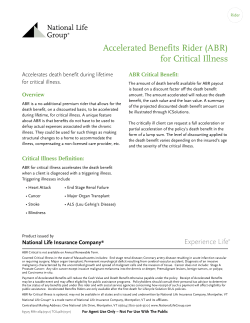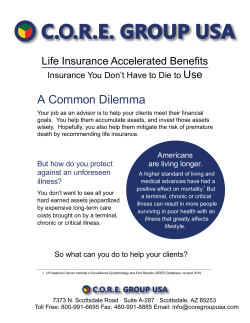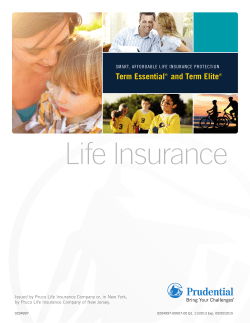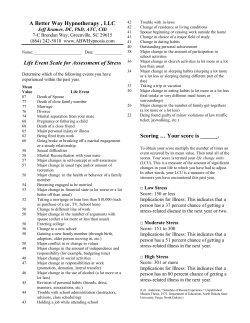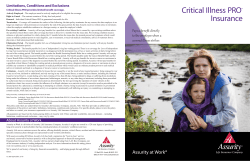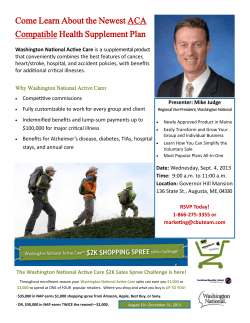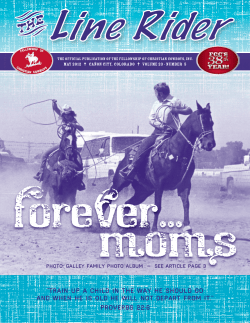
Accelerated Benefits Rider National Life Insurance Company
Life Insurance with Accelerated Benefits Rider Products issued by National Life Insurance Company® Life Insurance Company of the Southwest™ 10% National Life Group® is a trade name of National Life Insurance Company, Montpelier, VT, Life Insurance Company of the Southwest (LSW), Addison, TX and their affiliates. Each company of National Life Group is solely responsible for its own financial condition and contractual obligations. LSW is not an authorized insurer in New York and does not conduct insurance business in New York. Not For Use in Oregon 63501a MK2834(0412) TC65940(0412) A Common Dilemma You’re building a good life for yourself and your family. You have accumulated assets in anticipation of a comfortable lifestyle at retirement. Purchasing life insurance will help provide a measure of security to your families in the event of death. At your death, the income tax-free proceeds provided by life insurance are paid directly to your beneficiary; free from the costs, delays and publicity of probate. Additionally, while you are living, some types of life insurance have the potential to build cash value on a tax-deferred basis. Because the cash value belongs to you, you are allowed to borrow or withdraw from the policy.1 There are many optional riders available at an additional cost that may also be added to customize life insurance based on your needs, including such riders as: • Waiver of Premium Rider • Children’s Term Rider • Other Insured Rider But how do you protect against an unforeseen illness? You don’t want to see all your hard earned assets jeopardized by expensive long-term care costs brought on by a terminal, chronic or critical illness. Americans are living longer. A higher standard of living and medical advances have had a positive effect on mortality.2 But a terminal, chronic or critical illness can result in more people surviving in poor health with an illness that greatly affects lifestyle. So what can you do? 1 Policy loans and withdrawals reduce the policy’s cash value and death benefit and may result in a taxable event. Surrender charges may reduce the policy’s cash value in early years. 2 US National Cancer Institute’s Surveillance Epidemiology and End Results (SEER) Database, revised 2010. 3 Payment of accelerated benefits may reduce the cash value and death benefit and may result in a taxable event. Men have a 1 in 2 lifetime risk of developing cancer during their lifetime, for women the risk is 1 in 3.2 An Uncommon Solution You can add a rider to your insurance policy that will also protect you while you are alive from the potential financial impact of a terminal, chronic or critical illness. We call this life insurance you don’t have to die to use. Accelerated Benefits Rider (ABR) ABR is a no-additional cost rider which lets you access your death benefit, on a discounted basis, should you become terminally, chronically or critically ill.3 This rider can provide the funds you need to pay any expenses you incur, allowing you to preserve other assets or investments. The use of benefits are not restricted and may be used for any expense including: • medical expenses • additional care • home renovation • business expenses • travel ABR proceeds for chronic illness in the state of Massachusetts can only be used to pay for expenses incurred for Qualified Long-Term Care Services. 4 4 Qualified Long-Term Care Services: The necessary diagnostic, preventative, therapeutic, curing, treating, mitigating and rehabilitative services, and maintenance or personal care services that are required by a chronically ill individual and are provided pursuant to a plan of care prescribed by a licensed health care practitioner. Do You Have Living Benefits? Isaac Isaac’s doctor has told him he has less than two years to live. Using the Terminal Illness rider, he chooses to access his death benefit to enjoy life to the fullest during his last two years.5 Sophie Sophie, at age 79, becomes chronically ill and enters a nursing home. Her Chronic Illness rider allows her to help pay for her nursing home stay and other medical expenses.5 The cost of a semi-private room rose 3.5% in 2010 to an average of $205 a day ($74,825 per year). The cost of a private room rose 4.6% to an average of $229 a day ($83,585 per year)6 5 Payment of accelerated benefits may reduce the cash value and death benefit, may be a taxable event and may affect eligibility for public assistance programs. ABR proceeds for chronic illness in the state of Massachusetts can only be used to pay for expenses incurred for Qualified Long-Term Care Services. 6 US News and World Report, 2010 Nicholas Nicholas, a husband and father of two, suffers a severe heart attack at the age of 54. He is able to use the money from his Critical Illness rider to cover his medical expenses, and pay off his family’s mortgage.5 Barry and Melissa Barry and Melissa are parents of college age children. Through policy loans and withdrawals, they are able to use some of their policy’s accumulated value to offset tuition payments.7 Surviving stroke victims face an average of $140,000 in personal costs over their lifetimes.8 Every 45 seconds someone suffers a stroke. 7 Policy loans and withdrawals reduce the policy’s cash value and death benefit and may be a taxable event. Surrender charges may reduce policy cash values in the early years of the contract. 8 American Heart Association: Heart disease and stroke stats, 2009. When are Rider Benefits Available? Terminal Illness – If you are suffering from a terminal illness that will result in death within 24 months,9 you may elect to accelerate benefits under the rider. Chronic Illness – If you are certified chronically ill by a licensed health care practitioner within the last 12 months, and are unable to perform without substantial assistance, two out of six Activities of Daily Living (ADLs) for a period of at least 90 days, you may choose to accelerate benefits under the rider. The six activities are defined as eating, toileting, transferring, bathing, dressing and continence. Critical Illness – If you suffer a critical illness, such as a heart attack, stroke, a major organ transplant or have been diagnosed with cancer, end stage renal failure or ALS (Lou Gehrig’s disease) or blindness, your benefits can be accelerated. Covered critical illnesses are heart attack (myocardial infarction), stroke, diagnosis of cancer, diagnosis of end-stage renal failure, major organ transplant, diagnosis of ALS (amyotrophic lateral sclerosis), or blindness (corrected vision no better than 20/200 in both eyes). Covered Critical illness in the state of MA 8165MA(0609) includes: Coronary artery disease resulting in acute infarction vascular or requiring surgery; End-stage Renal Disease; Major organ transplant; Permanent neurological deficit resulting from cerebral vascular accident; Diagnosis of an invasive malignancy characterized by the uncontrolled growth and spread of malignant cells and the invasion of tissue. Cancer does not include: Stage A Prostate Cancer, Any skin cancer, except invasive malignant melanoma into the dermis or deeper, Pre-malignant lesions, benign tumors, or polyps, and Carcinoma in situ. Of all Americans 65 or older, one-half of the women and one-third of the men expect to spend at least 2.5 years in a nursing home.7 Waiting Periods ABR Terminal does not have a waiting period. ABR Chronic must be in force for two years before benefits are available.10 ABR Critical must be in force for 90 days before benefits are available. 9 Twelve Months CT, NY and PA. 10 There is no waiting period for chronic illness benefits in NY. By 2020 12 million older Americans will require long-term care services. Once you have added the rider, you can rest assured, knowing you have the benefits needed to help with the costs associated with a terminal, chronic or critical illness. By 2025, it is projected that the 75+ population will increase 70%12 • up to $113,150 (2012) per year for chronic illness (indexed annually) • up to a total lifetime benefit of $1 million for a terminal and chronic illness11 • ABR benefits are intended to qualify for favorable tax treatment With ABR, you can protect your assets, maintain choice and independence and help ensure you will have the funds needed to get the care you need should a terminal, chronic or critical illness strike. Some restrictions regarding minimum policy size apply. 11 Lifetime benefits for chronic illness in NY are $2,000,000. 12 Senior Care Market Place Statistics, 2010 The Accelerated Benefits Rider (form series 7490/7493/9744/ICC10-8843(0310)) is available on various Whole Life, Universal Life and Indexed Universal Life policies underwritten by National Life Insurance Company. The Accelerated Benefits Rider (form series 8052/8095/8165/ICC10-8844(0310) is available on various universal life and indexed universal life policies underwritten by Life Insurance Company of the Southwest. Riders are optional and may not be available on all policies or in all states. The Accelerated Benefits Rider offered under these riders are intended to qualify for favorable tax treatment under the Internal Revenue Code of 1986. Whether such benefits qualify depends on factors such as your life expectancy at the time benefits are accelerated or whether you use the benefits to pay for necessary long-term care expenses, such as nursing home care. If the acceleration-of-life-insurance benefits qualify for favorable tax treatment, the benefits will be excludable from your income and not subject to federal taxation. Tax laws relating to acceleration-of-life-insurance benefits are complex. You are advised to consult with a qualified tax advisor about circumstances under which you could receive acceleration-of-life-insurance benefits excludable from income under federal law. Some restrictions regarding minimum policy size apply. Receipt of acceleration-of-life-insurance benefits may affect you, your spouse or your family’s eligibility for public assistance programs such as medical supplementary social security income (SSI), and drug assistance programs. You are advised to consult with a qualified tax advisor and with social service agencies concerning how receipt of such a payment will affect you, your spouse’s and your family’s eligibility for public assistance. We currently limit the amount of death benefit that may be accelerated under all accelerated benefit riders applying to the same insured to $1,000,000. We reserve the right to change this limit in the future, however the limit will never be less than $500,000. Critical illness is not available in Connecticut and New Jersey. Please see below for information about the New York version of the Chronic Illness rider. The ABR Chronic II Accelerated Benefit Rider for Covered Chronic Illness (form 8591NY (0108), Covered Chronic Illness ABR with Traditional Life (20006NY(0511) is optional and only available in New York on policies underwritten by National Life Insurance Company. The maximum amount, over the entire lifetime of the Insured, that will be accelerated or converted to reduced paid-up insurance under all contracts made on the life of the Insured is $2,000,000. Receipt of Accelerated Benefits may be taxable and may affect eligibility for public assistance programs such as medical assistance (Medicaid), Aid to Families with Dependent Children, and Supplemental Security Income. Prior to applying for Accelerated Benefits, policy owners should seek assistance from a qualified tax advisor and consult with the appropriate social services agency concerning how receipt will affect the eligibility of the recipient and/or the recipient’s spouse or dependents. This product is a life insurance policy with a rider that accelerates the death benefit on account of chronic illness and is not a health insurance policy providing long-term care insurance subject to the minimum requirements of New York Law, does not qualify for the New York State Long-Term Care Partnership program and is not a Medicare supplement policy. National Life Group® is a trade name of National Life Insurance Company, Montpelier, VT, Life Insurance Company of the Southwest (LSW), Addison, TX and their affiliates. Each company of National Life Group is solely responsible for its own financial condition and contractual obligations. LSW is not an authorized insurer in New York and does not conduct insurance business in New York. Centralized Mailing Address: One National Life Drive, Montpelier, VT 05604 | www.NationalLifeGroup.com
© Copyright 2025
